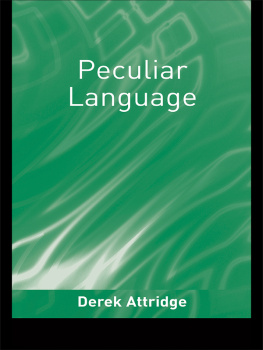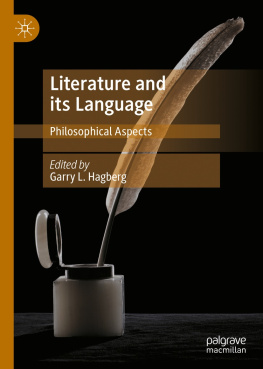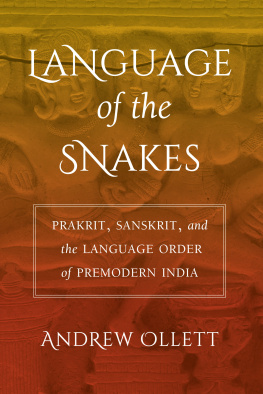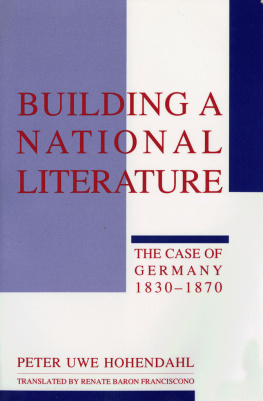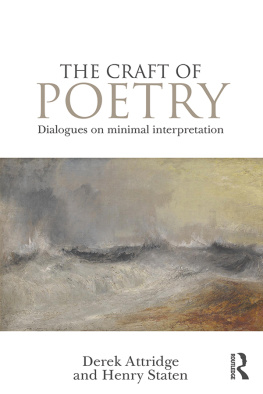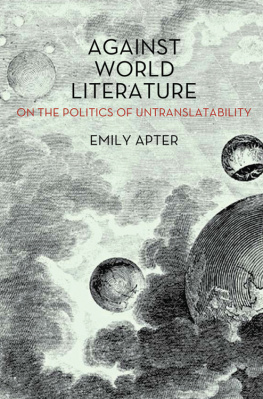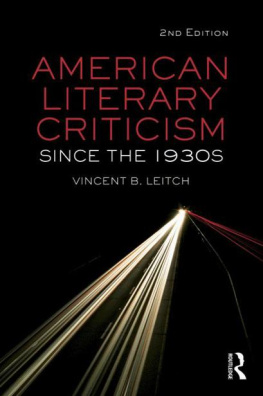PECULIAR LANGUAGE
First published in 1988, Peculiar Language is now established as one of the most important discussions of the language of literature.
This thought-provoking book challenges traditional notions of literary criticism, arguing that all attempts by writers, critics and literary theorists to define the language of literature have involved self-contradiction. Through examination of key moments in literary history, Derek Attridge demonstrates that such contradictions in accounts of literary language are embedded in our cultural concept of literature, and asserts that in order to appreciate the forces that determine the limits of literary language we must look beyond the realm of the literary and embrace the wider political and social sphere. While key examples have been drawn from the Renaissance, Romanticism and the work of James Joyce, Attridges unique application of deconstructive methods have ensured that the influence of this book has been felt across the entire field of literary studies.
Re-issued as a result of recent critical interest in the book, this edition includes a new preface by the author. Alongside his new book, The Singularity of Literature, Peculiar Language confirms Derek Attridges place at the forefront of contemporary critical theory.
Derek Attridge is Professor of English at the University of York, England. He is the author and editor of leading texts on fiction, poetry and literary theory. Recent publications include Meter and Meaning: An Introduction to Rhythm in Poetry (2003) and The Singularity of Literature (2004).
PRAISE FOR THE FIRST EDITION OF PECULIAR LANGUAGE
Derek Attridges brilliant tour de force of the relationship between language and literature from the Renaissance to modern times is beautifully written and patiently argued through an analysis of representative texts [ ] One can hardly do justice to Peculiar Language in a short review. The book tackles major themes in intelligent and informative ways, and must be read and digested slowly to be appreciated fully. Journal of Modern Literature
exhilarating and inspiring Notes and Queries
witty, informative and continuously intelligent [] Attridge has written an exceptionally distinguished book which shows how his reading of the text can be a liberating experience even liberal, in the classic sense, in posing essential questions and then looking to the reader to decide. Christopher Butler, James Joyce Broadsheet
Hovering between a poised critique of criticism and a pragmatic reading of rhetorical blind spots in texts, Attridges own text confirms him as a subtle reader and writer. Laurent Milesi, Modern Fiction Studies
Peculiar Language is invaluable to Joyceans, and some of its discussions [] will no doubt become classics. Brian McHale, JJLS
We have only begun to explore the code of literary language through the historical mapping of literature as an institution. Derek Attridges excellent work makes such a task even more urgent than it was before. Patrick McGee, James Joyce Quarterly
ALSO BY DEREK ATTRIDGE
As author
Well-weighed Syllables: Elizabethan Verse in Classical Metres
The Rhythms of English Poetry
Poetic Rhythm: An Introduction
Joyce Effects: On Language, Theory, and History
Meter and Meaning (with Thomas Carper)
J. M. Coetzee and the Ethics of Reading: Literature in the Event
The Singularity of Literature
As editor
Post-structuralist Joyce: Essays from the French (with Daniel Ferrer)
Post-structuralism and the Question of History (with Geoff Bennington and Robert Young)
The Linguistics of Writing: Arguments between Language and Literature (with Nigel Fabb, Alan Durant, and Colin MacCabe)
The Cambridge Companion to James Joyce
Acts of Literature, by Jacques Derrida
Writing South Africa: Literature, Apartheid, and Democracy 19701995 (with Rosemary Jolly)
Semicolonial Joyce (with Marjorie Howes)
James Joyces Ulysses: A Casebook
First published 1988 by Methuen & Co. Ltd
11 New Fetter Lane, London EC4P 4EE
This edition published 2004 by Routledge
11 New Fetter Lane, London EC4P 4EE
Simultaneously published in the USA and Canada by Routledge
29 West 35th Street, New York, NY 10001
Routledge is an imprint of the Taylor & Francis Group
This edition published in the Taylor & Francis e-Library, 2005.
To purchase your own copy of this or any of Taylor & Francis or Routledges collection of thousands of eBooks please go to www.eBookstore.tandf.co.uk.
1988, 2004 Derek Attridge
All rights reserved. No part of this book may be reprinted or reproduced or utilised in any form or by any electronic, mechanical, or other means, now known or hereafter invented, including photocopying and recording, or in any information storage or retrieval system, without permission in writing from the publishers.
British Library Cataloguing in Publication Data
A catalogue record for this book is available from the British Library
Library of Congress Cataloging in Publication Data
A catalog record for this book has been requested
ISBN 0-203-46297-1 Master e-book ISBN
ISBN 0-203-67188-0 (Adobe eReader Format)
ISBN 0-415-34058-6 (Print edition)
IN MEMORY OF MY MOTHER MARJORIE JULIA ODELL
ACKNOWLEDGMENTS
ONE of the pleasures of completing this book has been to look back over the years of its growth and to appreciate for the first time just how many generous individuals its pages bear witness to, albeit imperfectly and for the most part silently. I can mention only a few here by name, but my thanks go to all who assisted, knowingly or unknowingly. Suzanne Halls participation in every aspect of the project from start to finish has been immeasurably important. Robert Young and Maud Ellmann challenged me into rethinking old positions, and generously shared their expertise. Helpful comments on draft material came from Margaret Ferguson, Morris Halle, Daniel Javitch, William Keach, Sandra Kemp, Bella Millett, Mary Nyquist, Julian Patrick, David Quint, Frank Stack, Edward Tayler, and Penelope Wilson. Others who encouraged, advised, and helped in various ways were Bernard Benstock, Jacques Berthoud, Jonathan Culler, Jacques Derrida, Daniel Ferrer, John Hollander, Peter Keating, Colin MacCabe, Jean-Michel Rabat, Richard Rand, Arden Reed, Christine Roulston, Fritz Senn, and Samuel Weber. Students and colleagues in the English Departments of Southampton and Rutgers Universities and the English Studies Department of Strathclyde University made numerous valuable contributions along the way. I am glad to acknowledge financial assistance from the British Academy, the Carnegie Trust for the Universities of Scotland, and the Fulbright-Hays Program. My thanks go also to the many individuals and institutions whose invitations to lecture provided the occasions for the papers that lie behind most of these chapters and to the audiences whose questions and comments stimulated further work on them.
Earlier versions of some parts of this book have appeared as follows: in Genre 17 (1984): 375400. I am grateful to the editors and publishers of these journals and collections for permission to reprint.
Although they are linked by their concern with a common and recurring set of problems and follow a historical trajectory, address particular issues through discussions of specific texts, and there should be no difficulty in reading them independently of one another or out of sequence.

